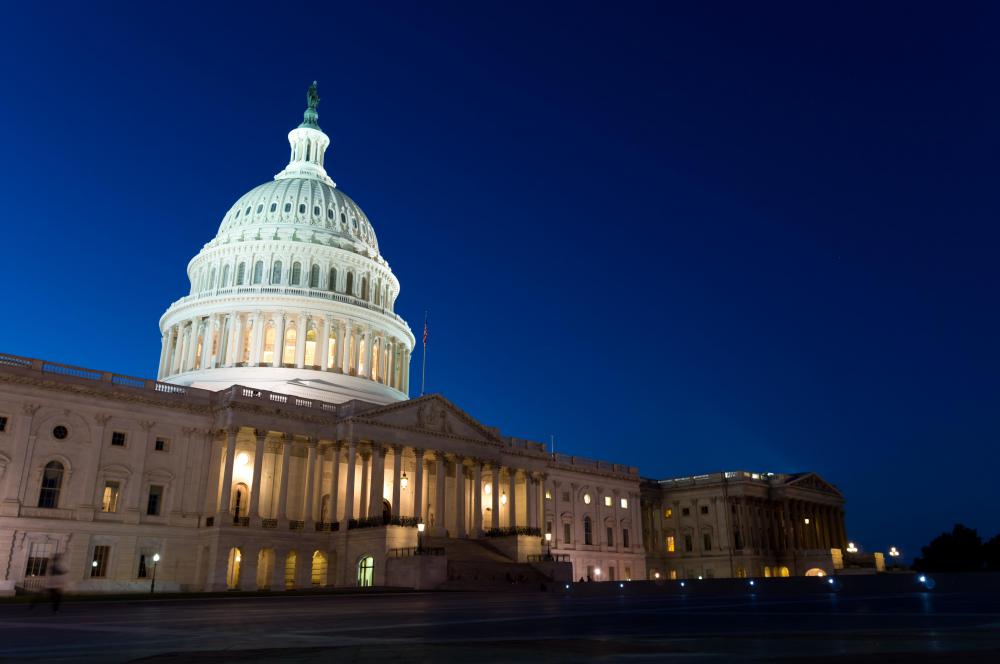At WiseGEEK, we're committed to delivering accurate, trustworthy information. Our expert-authored content is rigorously fact-checked and sourced from credible authorities. Discover how we uphold the highest standards in providing you with reliable knowledge.
What is the FairTax?
FairTax is both a theory and a suggested plan to the US Congress that would eliminate all income taxes and the Internal Revenue Service (IRS) in its current incarnation. All taxes under FairTax, including social security, disability, or Medicare taxes would be eliminated, leaving Americans with a larger portion of their earnings. Additionally, FairTax would do away with taxes on capital gains, inheritance, taxes on businesses, and taxes on homes, at least at the federal level.
Instead of levying taxes on these commonly taxed sources, a national sales tax of 23% on most goods and services would be instituted. Each month, people would get something of a tax break on their spending, up to the poverty level, in order to reduce tax burden on people with less money. Essentially, they’d get a tax rebate that would enable them to keep more money — proponents of FairTax call this a "prebate."

FairTax would then use taxes gathered to pay for social systems in place, like social security or Medicare, and proponents of the tax plan insist that FairTax would lower prices, since businesses would not have to pay corporate taxes. Production costs would thus be lower which would result, in theory, in lower costs for consumers.
Spending would indicate the amount of tax you would pay under FairTax. People who spend a lot of money would obviously pay more in taxes than people who spend very little. This would be considered fair since it is normally assumed that people with larger incomes spend more money. This is not always the case, but it is frequently the case. The government would save money too, because it would not have to support the huge government structure of the IRS.
FairTax would mean that most people would pay about 30% in taxes on purchases because state and city sales tax is not eliminated under the plan. FairTax would solve a significant problem in the US — failure to comply with filing income tax forms, or paying taxes. Illegal immigrants who work “under the table,” would not be exempt from paying their share of taxes, since tax would be based on purchases rather than income.
The principle supporters of the FairTax movement are radio personality Neal Boortz, and congressmen John Linder. A few non-partisan groups including Americans for Fair Taxation (AFFT) have also supported FairTax. Many are now familiar with the theories proposed by Linder and Boortz through the book, The FairTax Book, which was for a time the number one book on the Best Seller lists of the New York Times.
Opponents of the FairTax plan say the monthly reporting required to get tax rebates would be challenging. They predict that FairTax would lead to an underground network of sellers and purchasers who would buy and sell things without paying the FairTax. Many argue that the state sales tax is already onerous, and that paying an additional 23% would be extremely difficult. Some feel that those with the lowest incomes and education would have the biggest challenge understanding new tax laws and avoiding being unfairly taxed.
AS FEATURED ON:
AS FEATURED ON:











Discussion Comments
The FairTax is progressive. Don't forget people who need money for necessities will have the prebate. Actually everybody can request it, except for illegal aliens, crooks, and so forth. People who make more money will spend more money, but only for new items and services with the exception of education. It takes a while to explain, but in my opinion, it is by far the best.
Regressive tax? Maybe you need to look that one up, anon. I believe REgressive taxation is the opposite of PROgressive taxation. Meaning that the poor would pay a higher percentage of their wages in taxes, as apposed to the current system where the rich pay a higher percentage of their income in taxes.
The fair tax simply has to do with how much you spend - if you are rich and spend a lot you pay a lot in taxes. If you are poor and spend a lot, you pay a lot in taxes. Of course, the reverse is true. It encourages saving and responsibility.
And what in the world? The author said that an opponent argument is that those in the lower socioeconomic class would have trouble understanding the new tax and would be unfairly taxed?
The fair tax could easily take less than a page to write. How many thousands of pages is the current tax code? Even Timothy Geithner (the current United States Secretary of the Treasury, former president of the Federal Reserve Bank, and founder of Turbo Tax) can't figure out our current tax code. The fair tax would be unbelievably simple in comparison.
The fair tax is, in fact, fair. Those below poverty would still get welfare programs and perhaps even "prebates." Those who make an illegal living would now pay taxes (all those crack dealers who currently avoid taxes).
The vast majority of us would now have "skin in the game" and would see our taxes taken from us on a daily basis. This would encourage us to be sure our politicians spend our money wisely.
uhh, can you say regressive taxation?
Post your comments